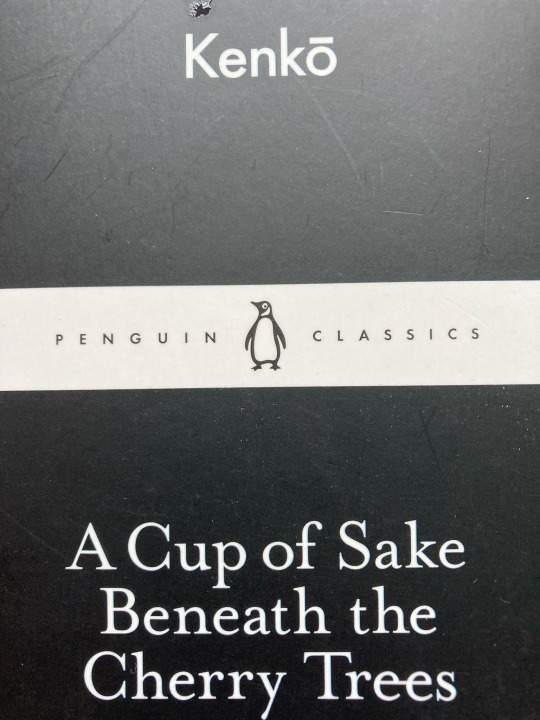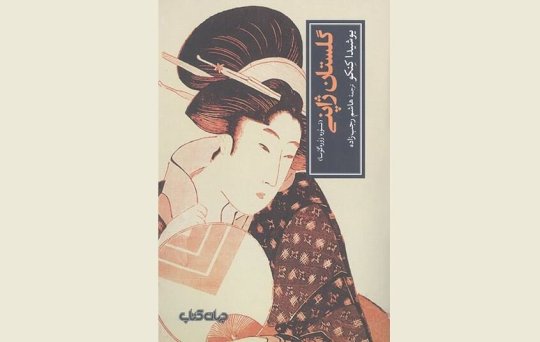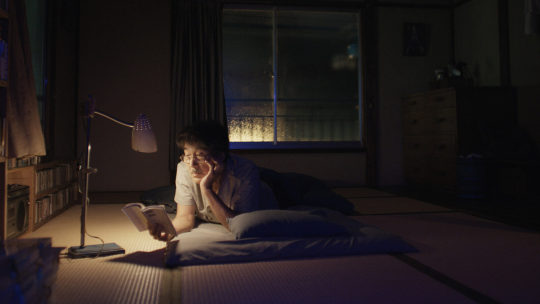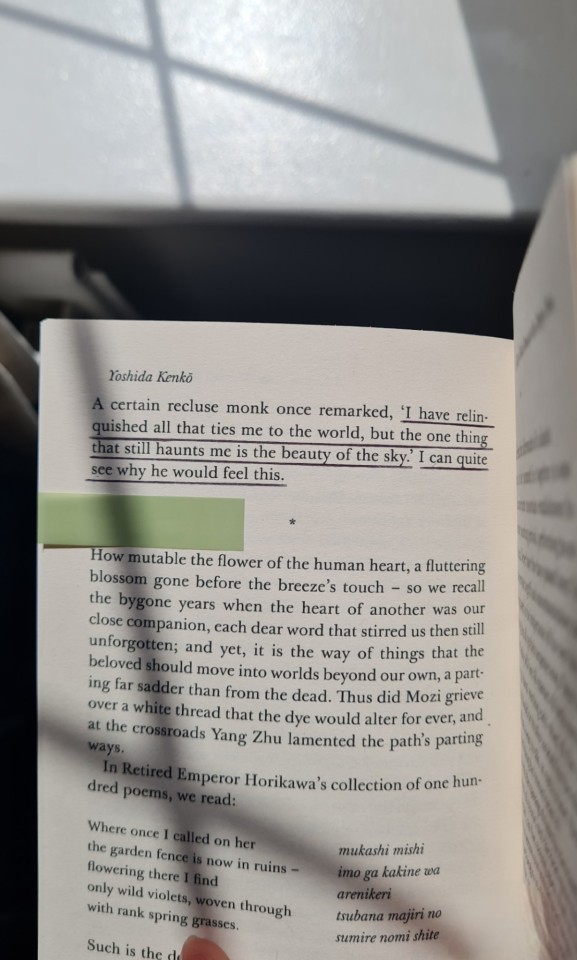#yoshida kenkō
Text
Du beau sur les #ReseauxSociaux :
A certains moments, dans le monde, une anecdote devient le racontar à la mode. Des gens dont ce n'est pas l'affaire n'ignorent rien de tous les détails qu'ils racontent à chacun, tout en en recherchant d'autres encore. Comme c'est répugnant !
(Urabe Kenkô, Les heures oisives)
7 notes
·
View notes
Text



A Cup is Sake Beneath the Cherry Trees, by Kenkō
#just finished#reading#books#a cup of sake beneath the cherry trees#kenkō#yoshida kenkō#japanese literature#love of books#ephemera#quotes about reading#quotes about books
3 notes
·
View notes
Text
It is a most wonderful comfort to sit alone beneath a lamp, book spread before you, and commune with someone from the past whom you have never met.
-
Essays in Idleness by Yoshida Kenkō
2 notes
·
View notes
Text
Yoshida Kenko gets welcomed in Iran
It’s a real Good one when the writings of Shinto,Japanese monk Yoshida Kenko* get officially licenced in Iran.See: https://www.tehrantimes.com/news/478393/Tsurezuregusa-of-Kenko-published-in-Persian *He lived between Muromachi and Kamakura period.

“Tsurezuregusa of Kenko” published in Persian
Jahan-e Ketab is the publisher of the book, which has been compared to the Gulistan (The Rose Garden), Persian poet Sadi’s masterpiece. It has been translated into Persian by Hashem Rajabzadeh.
Despite the turbulent times in which he lived, the Buddhist priest Kenko met the world with a measured eye.
As Emperor Go-Daigo fended off a challenge from the usurping Hojo family, and Japan stood at the brink of a dark political era, Kenko held fast to his Buddhist beliefs and took refuge in the pleasures of solitude.

Written between 1330 and 1332, “Essays in Idleness” reflects the congenial priest’s thoughts on a variety of subjects.
His brief writings, some no more than a few sentences long and ranging in focus from politics and ethics to nature and mythology, mark the crystallization of a distinct Japanese principle: that beauty is to be celebrated, though it will ultimately perish.
Through his appreciation of the world around him and his keen understanding of historical events, Kenko conveys the essence of Buddhist philosophy and its subtle teachings for all readers.
Insisting on the uncertainty of this world, Kenko asks that we waste no time in following the way of Buddha.
An English translation by Donald Keene was published in 1998. This critically acclaimed translation is joined by a new preface, in which Keene himself looks back at the ripples created by Kenko’s musings, especially for modern readers.
“Essays in Idleness: The Tsurezuregusa of Kenko” is his most famous work was and is one of the most studied works of medieval Japanese literature.
Kenko (1283?–1350?) was a Japanese author and Buddhist monk. He wrote during the Muromachi and Kamakura periods.
Photo: Front cover of the Persian edition of Yoshida Kenko’s “Essays in Idleness: The Tsurezuregusa of Kenko”.
#Essays in Idleness: The Tsurezuregusa of Kenko#兼好#Yoshida Kenkō#culture#Iran-Japan ties#1283–1350#Muromachi period#室町時代#Ashikaga era#Emperor Go-Daigo#後醍醐天皇#Kamakura period#鎌倉時代#Shōgun#Minamoto no Yoritomo#源 頼朝#Tehrantimes
2 notes
·
View notes
Text
Perfect Days
“Perfect Days” nie jest filmem o człowieku, który kocha życie, który cieszy się każdą chwilą, to nie jest film o drobiazgach, prozie życia w japońskim duchu. Film ten, jest o człowieku, który nie chce zostać odnaleziony.
Continue reading Perfect Days

View On WordPress
#antropologia#axis mundi#Daido Moriyama#dekonstrukcja#demitologizacja#Hidefumi Nakamura#japonia#japońskie toalety#Jean Baudrillard#Kinema Chromatica#krytyka filmowa#krytyka Perfect Days#Lafcadio Hear#mobilność klasowa#Perfect Days#recenzja filmu#recenzja Perfect Days#toalety#toalety publiczne#Tomasz Raczek#ubóstwo#Vivian Meier#Vivien Maier#Wim Wander#Yakumo Koizumi#Yoshida Kenkō#Łukasz Mańkowski
0 notes
Text

Title: Essays in Idleness and Hōjōki | Author: Yoshida Kenkō / Kamo no Chōmei | Publisher: Penguin (2013)
1 note
·
View note
Text

Weekly Manga Nihonji (週刊マンガ日本史) / Asahi Shimbun Publications (朝日新聞出版) / 9th Aug 2015 issue (Featured historical figure: Yoshida Kenkō)
#educational manga#japanese history#yoshida kenkō#kenko#asahi shimbun#週刊マンガ日本史#朝日新聞出版#2010s manga#issue month: august
0 notes
Quote
You can decide to do something today, but before you manage it some unexpected and urgent business will arise to overwhelm your plan for the day, or the person you are waiting for is unable to come, or someone unexpected arrives, or something you were relying on turns out differently, so that the only things that go well are things you hadn't anticipated. Matters that threatened to be difficult prove easy, while those that should be straightforward turn out to cause you great pains. The progress of each passing day is quite unlike your anticipation of it. And the same goes for a year - and for a life. Yet if you assume everything you anticipate will go awry, you find that in fact some things don't, which makes it all the more difficult to plan. The only certain truth to learn is that all is uncertain.
Yoshida Kenkō (x)
0 notes
Text


first read of may — a cup of sake beneath the cherry trees by yoshida kenkō
moonlight, sake, spring blossom, idle moments, a woman's hair. 'a cup of sake beneath the cherry trees' is a collection of fragments from the journal of a 13th-century monk, as he reflects on the pleasures of life and its passing moments. i think there's something in here for everyone to admire, with its reflective themes, philosophical undertones, and beautiful writing and imagery.
i definitely recommend!! 🌱
#3.5 stars#classics#book review#review#literature aesthetics#books#book#bookish#bookblr#bookworm#bookstagram#dark academia#booklover#books and libraries#reading log#a cup of sake beneath the cherry trees#yoshida kenko#studyblr#study space#study tips#quotes#annotated bibliography#book log
614 notes
·
View notes
Text
“To sit alone in the lamplight with a book spread out before you, and hold intimate converse with men of unseen generations - such is a pleasure beyond compare."
— Yoshida Kenkō, medieval Buddhist monk (1283-1350)
132 notes
·
View notes
Text
Conseil (Choses à oublier soigneusement)
Supériorité sur autrui est toujours grand dommage. Celui qui, par l'éminence de sa condition, l'excellence de son talent ou la gloire de ses ancêtres, s'estime supérieur à autrui, n'en fit-il point état en paroles, ne laisse pas d'avoir au cœur de nombreux défauts : il faut prendre soin d'oublier ces choses.
(Urabe Kenkô, Les heures oisives)
[…] Il n'est rien comme cette fatuité pour donner l'air d'un sot, pour susciter la médisance et pour inviter le malheur.
4 notes
·
View notes
Text
Isn’t This the Truth?
It is a most wonderful comfort to sit alone beneath a lamp, a book spread before you, and commune with someone from the past whom you have never met. —Yoshida Kenkō, Essays in Idleness, translated by Meredith McKinney
Isn’t This the Truth?
2 notes
·
View notes
Text
Young People
4th century BCE
“They think they know everything, and are always quite sure about it.” -- Rhetoric, Aristotle
“[Young people] are high-minded because they have not yet been humbled by life, nor have they experienced the force of circumstances.” -- Rhetoric, Aristotle
1st century BCE
“The beardless youth… does not foresee what is useful, squandering his money.” -- Horace
20 BCE
“Our sires’ age was worse than our grandsires’. We, their sons, are more worthless than they; so in our turn we shall give the world a progeny yet more corrupt.” -- Book III of Odes, Horace
1330s
"Modern fashions seem to keep on growing more and more debased … The ordinary spoken language has also steadily coarsened. People used to say ‘raise the carriage shafts’ or ‘trim the lamp wick,’ but people today say ‘raise it’ or ‘trim it.’ When they should say, ‘Let the men of the palace staff stand forth!’ they say, ‘Torches! Let’s have some light!’” -- Tsurezuregusa (Essays in Idleness), Yoshida Kenkō
1624
“Youth were never more sawcie, yea never more savagely saucie . . . the ancient are scorned, the honourable are contemned, the magistrate is not dreaded.” -- The Wise-Man’s Forecast against the Evill Time, Thomas Barnes
1771
“Whither are the manly vigour and athletic appearance of our forefathers flown? Can these be their legitimate heirs? Surely, no; a race of effeminate, self-admiring, emaciated fribbles can never have descended in a direct line from the heroes of Potiers and Agincourt…” -- Letter in Town and Country magazine republished in Paris Fashion: A Cultural History
1790
“The free access which many young people have to romances, novels, and plays has poisoned the mind and corrupted the morals of many a promising youth…” -- Memoirs of the Bloomsgrove Family, Reverend Enos Hitchcock
1843
“…a fearful multitude of untutored savages… [boys] with dogs at their heels and other evidence of dissolute habits…[girls who] drive coal-carts, ride astride upon horses, drink, swear, fight, smoke, whistle, and care for nobody…the morals of children are tenfold worse than formerly.” -- Anthony Ashley Cooper, the 7th Earl of Shaftesbury, Speech to the House of Commons
1904
“Never has youth been exposed to such dangers of both perversion and arrest as in our own land and day. Increasing urban life with its temptations, prematurities, sedentary occupations, and passive stimuli just when an active life is most needed, early emancipation and a lessening sense for both duty and discipline…” -- The Psychology of Adolescence, Granville Stanley Hall
1925
“We defy anyone who goes about with his eyes open to deny that there is, as never before, an attitude on the part of young folk which is best described as grossly thoughtless, rude, and utterly selfish.” -- The Conduct of Young People, Hull Daily Mail
1938
“Cinemas and motor cars were blamed for a flagging interest among young people in present-day politics by ex-Provost JK Rutherford… [He] said he had been told by people in different political parties that it was almost impossible to get an audience for political meetings. There were, of course, many distractions such as the cinema…” -- Young People and Politics, Kirkintilloch Herald, 1938
1951
“Many [young people] were so pampered nowadays that they had forgotten that there was such a thing as walking, and they made automatically for the buses… unless they did something, the future for walking was very poor indeed.” -- Scottish Rights of Way: More Young People Should Use Them, Falkirk Herald
1995
“The traditional yearning for a benevolent employer who can provide a job for life also seems to be on the wane… In particular, they want to avoid ‘low-level jobs that aren’t keeping them intellectually challenged.’” -- Meet Generation X, Financial Times
2017
“Millennials are lazy and think basic tasks are beneath them.” -- A generation with a huge sense of entitlement, Daily Mail
#young people#young adult#generations#generation gap#old people being old#old people#younger generation#quotable quotes#quote of the day#i'm just saying
2 notes
·
View notes
Text
12 September 2023, Tuesday
I got inspired today. I got out of bed today with a plan: To eat at Maisen because I have been craving their katsu curry. And as it so happens when I go out alone -- one thing led to another. After munching on the delicious cut of pork tenderloin crisp to perfection and smothered in luscious curry sauce, I decided to go to the bookstore. Fully booked (as always) with that one guard who always follows me through the aisles because I look so much like someone who shoplifts books (sarcastic). Traipsing along the rows of books I have memorized for visiting too often, I come across the poetry and memoirs section. And there, lodged between thick glossy books is a copy of 'The Unabridged Journals of Sylvia Plath'; and as I said, I got inspired. Listing down other books I want to buy before I forget: (1) Essays in Idleness by Yoshida Kenkō, (2) The Year of Magical Thinking by Joan Didion, (3) If not, Winter by Sappho, translated by Anne Carson.
I got inspired, and so the birth of this journal. I have accepted that I am bad at sticking with habits and routines because I fancy myself as a too spontaneous, easily distracted girl, but I would have to split myself open, harvest my soul, and ship it out to sea before I give up on writing; even if it is just about the silly happenstance that is my life.
So it begins...


#anaviane#diary#diary entry#journal entry#journaling#the journal club#writing#writeblr#spilled writing#spilled thoughts#spilled ink#journal#anavianepix
5 notes
·
View notes
Text

It's cruel to make people suffer and drive them to break the law, then treat the poor creatures as criminals.
— Yoshida Kenkō, A Cup of Sake Beneath the Cherry Trees
1 note
·
View note
Text

Del Tsurezuregusa 吉田兼好 Yoshida Kenkō
1 note
·
View note